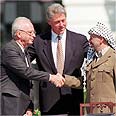
New trend gives peace activism meaning and clout
'Convergence' conference gives peace activism new energy
Convergence. I like the word. It has real power, if it can really be put to use.
Nowhere else have I seen a greater convergence of peace activists than in Puerto Rico, where I performed my Palestinian-Israeli comedy at a conference called “The Power of Oneness.” The conference was hosted by the Alliance for the New Humanity and its founder, doctor, author and advocate of mind-body medicine, Deepak Chopra.
Peace activists from across the globe converged, collaborated, dialogued, and spoke enthusiastically about the successes of their individual programs.
Of course, I was concerned most about seeing Palestinians and Israelis achieved a genuine peace with justice, a dream that has been illusive for nearly a century.
And maybe because the Palestine-Israel conflict is one of the longest struggling conflicts in the world today, naturally, there were many groups that brought Palestinians and Israelis, Jews and Arabs together under the same banner.
I was eft moved by the dedication so many are putting into achieving peace in Palestine and Israel.
Activism in form of television
Here’s a look at some of the organizations that I stumbled across and that left agreeing to converge into one larger network of peace.
One of my favorites, Seeds of Peace, was there in force, showcasing two of their more than 2,500 “graduates,” Palestinian Sharoq and Israeli Melvina. The organization boasts the Seeds of Peace Center for Coexistence in Jerusalem and a summer camp in the United States, in Maine.
Its students are selected in part through a partnership with 25 governments. And it was founded in 1993, the year I met its first students while attending the peace signing between two of my personal heroes, Yitzhak Rabin and Yasser Arafat, on the lawn of the White House.
Another fascinating concept is called “Chat the Planet,” which uses satellite television to link up students across the globe in frank and sometimes stunning dialogues.
This activism in the form of television reaches more than 290 million households worldwide, and reaches beyond the Palestine-Israel conflict to conflicted regions around the world.
A specific program that puts Palestinian and Israeli youth in the same classrooms in Israel is called “Hand in Hand.” Offering an integrated school setting at three school locations, Hand in Hand has provided bilingual, multicultural education to classes that began with only 50 Palestinian and 50 Israeli students in 1998 to more than 500 today.
The leaders of Hand in Hand spoke eloquently of the challenges they face and how they are overcome through respectful and person-to-person learning.
There was so much more there, including a full color magazine I found called “Du-Et,” which claims to be the only publication in Israel that is produced jointly by Jewish and Arab journalists.
Imagine, one day Israeli and Palestinian leaders like Ariel Sharon and Mahmoud Abbas will actually have Palestinian and Israeli journalists at their press conferences who are there to listen, query and report, rather than act as defenders of their respective causes. They’re getting close but they need to get closer, on both sides.
Animals eat for free
More than 32 similarly themed organizations that spanned conflicts from around the globe “converged” and left after three days agreeing to work together to achieve peace. And new media like Link TV offered a wide range of peace-focused programming.
Speakers who ranged from movie stars to moviemakers, authors, writers and entertainers, promised to find ways to help each other, recognizing that beyond the many individual conflicts are a few overriding goals.
The challenges of racism, hatred and economic oppression are more subtle today and require more sophisticated strategies to overcome.
Quotations from the famous echoed through the panels (“History is a nightmare from which we are trying to awaken" - James Joyce), and facts flourished: Only 14 percent of Americans hold passports which might suggest that most Americans are interested in themselves, even though American foreign policy drives, and maybe controls, the world.
And there were the very deep thoughts: Animals eat for free. The only mammals that are forced to pay for food are the human beings.
I left the conference encouraged on by the audience and by what I learned. Although I was quickly reminded by the news media reports of continued conflict that convergence is but a theory that needs to happen.
I do know that it is easy to hate a stranger and difficult to hate someone you know. Maybe by bringing their collective successes together, these and other groups can help redefine the paradigms that so often stand in the way of peace.
Ray Hanania writes humor and analysis for YnetNews.com. He can be reached at www.hanania.com.










